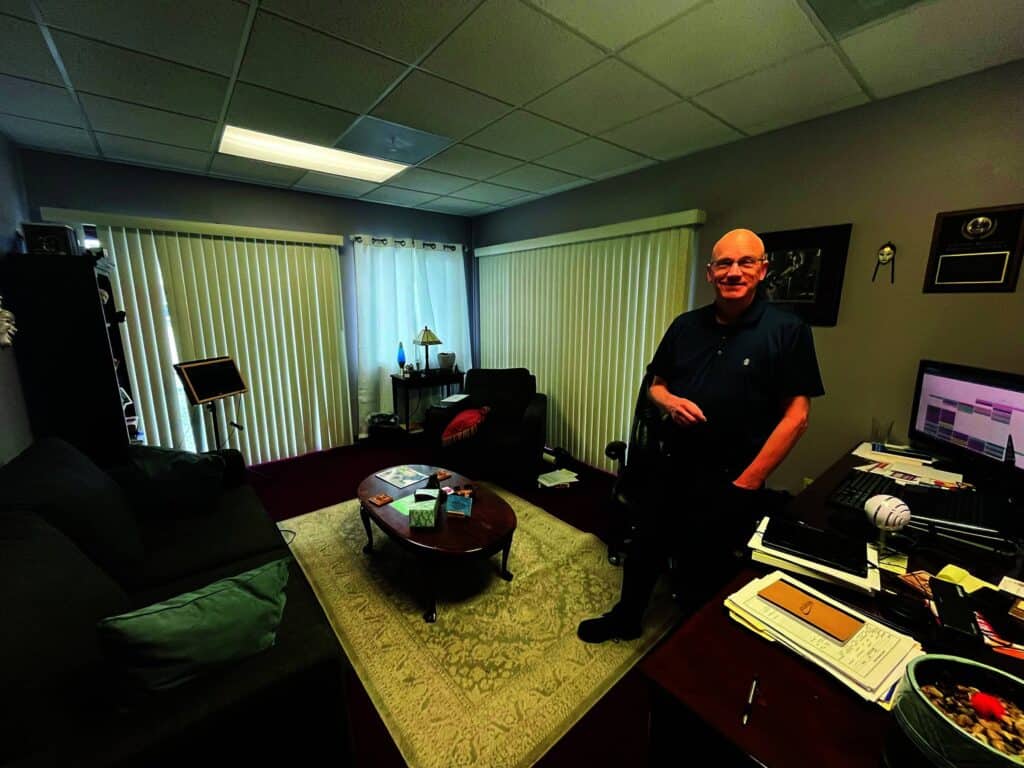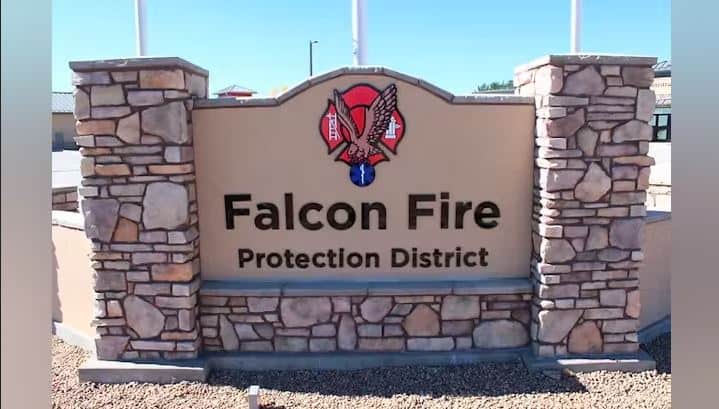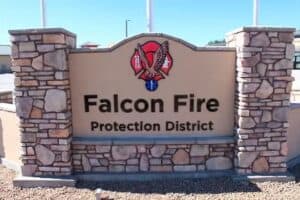By Jon Huang
Status Code 4 is a mental health nonprofit in Colorado Springs established in February 2017 by Daniel Crampton, who has a doctorate in psychology, and Ann Rush, who has a doctorate in education, to serve first responders like EMTs, firefighters, police officers and many others.
Before defining the work they do, Rush introduced the two canine members of their family: Codē, and Topa — in Lakota, the language of the Native American Sioux tribe, their names mean “Code” and “Four,” respectively.
Prior to Status Code 4, Crampton worked as a martial arts instructor teaching Kenpo in Oregon; he then switched careers and worked as a paramedic for 25 years in Teller, Douglas and El Paso counties. In 2001, shortly after 9/11, while working, he was studying for his bachelor’s in counseling and getting counseling himself. It was then he learned firsthand about the gap in care in the emergency services field.
Sleep deprived from his 24-on-24-off work schedule, battling his own marital difficulties and dealing with the suffering he witnessed on the job, Crampton realized there were few to none in the field who had any understanding of the lives of first responders. He remembers the advice his own therapist gave him.
“Her advice was to get out of EMS,” he said.
From his own experiences, he saw the importance of having culturally competent therapists in the field for first responders; and, as he progressed in his training, Crampton eventually decided to dedicate his own practice to the emergency services professionals.
In 2016, he met Rush, a retired Air Force captain. After her spouse died a year prior, she was searching for something that fed her soul when she met Crampton. From there, they began working out their vision to serve the first responder community.
Part of their vision is taking a more holistic view to treating the individual, providing both couples and single adult counseling, while also providing resources and education for families of first responders.
“We need to bring the family in, too, because you can’t separate the two … you can’t ignore the needs of your family at home,” Rush said.
Status Code 4 treats anyone in the EMS, firefighting and law enforcement community, extending their care to anyone involved in the line of work, which can include 911 dispatchers, correctional officers, coroners and victim advocates. They also recognize the limited budgets that many departments have toward mental health and provide a variety of free and low-cost programs such as resiliency training and peer support classes
“We try to meet the needs of the departments,” Rush added.
In the state of Colorado, about half of those in the first responder community are ex-military. Rush said many responders don’t always realize how much their jobs can elicit their past combat-related traumas. Within the first responder community there are higher rates of PTSD and depression, prescription substance abuse and suicide. According to the Colorado Department of Public Health, between 2004 and 2014, there were 196 first responder suicides in Colorado. In the eight years since, there have been 328, averaging four suicides a month, with El Paso County leading the way.
Status Code 4 provides counseling sessions free of charge through the aid of a variety of grants, private donations, state service contracts and their yearly golf tournament in May.
Status Code 4 provides counseling sessions free of charge through the aid of a variety of grants, private donations, state service contracts and their yearly golf tournament in May. This year, the tournament will be held May 10, from 11:30 a.m. to 5:30 p.m. at Cheyenne Shadows Golf Course, 1050 Titus Blvd., at Fort Carson. For more information, visit https://www.sc4i.org/events.
“We never want to have finances getting in the way of them getting the help they need,” Rush added.
Spirituality also plays a significant role for both Crampton and Rush. As Christians, they see it as an integrated part of both physical and mental treatment and health.
“We’ll check in with people and often times we’ll see people that are struggling are lacking the spiritual element of whatever it looks like for them, and so we just let them know that is a component to it and to seek out whoever is their spiritual leaders to have that conversation with them,” Rush said.
Crampton said that sometimes they can help people find purpose to their trauma and pain, using his own personal and professional life as an example of this. Throughout his career, he witnessed numerous pediatric deaths, went through a divorce and saw how his own struggles negatively impacted his outside relationships. He said he believes part of the purpose of all he went through was to help him effectively work with clients today.

For him, understanding firsthand the struggles of the people he serves helps him build rapport quickly, and this connection helps him in his work with the first responder and military community.
One of these challenges is vicarious trauma, which is an ongoing process of change over time that results from witnessing or hearing about other people’s pain and suffering.
“I’ve done training with a bunch of therapists in the room,” Rush said. “I’ll give a simple story, and you can see the traumatized look on their face by describing just a small piece of it. Oftentimes, this cultural competency is a protection factor for the clinician because if you have to try to interpret what they are describing in their own mind, sometimes you can make that be far worse than what they are seeing.”
Statistics from the CDPH show that almost half of first responder suicides involve those dealing with intimate partner problems and financial challenges. Rush speaks with spouses about what to expect from their partners in the field, and SC4 also provides resources on personal finance through the Dave Ramsey Financial Peace University.
SC4 incorporates clinical interns into their practice and is also seeking volunteers to assist with their community newsletters and other administrative tasks. In the future, they hope to expand their practice to include long term in-residence treatment for those needing more intensive care and an intentional communal living environment.
Crampton said their main goal in all these efforts is to help their clients achieve “Code 4,” which in the first responder community is the term used to communicate that a scene is under control and the scene is safe.
For Crampton and Rush, their work is more than a job.
“It is our ministry,” Rush said. “It’s our way of giving back to our community.”





